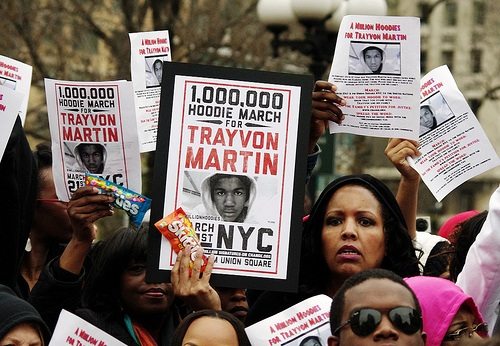
July 14, 2013; National Public Radio, “The Two-Way”
George Zimmerman’s acquittal on murder and manslaughter charges on Saturday was both a nasty shock to, and completely expected by, millions.
Amid spontaneous public protests across the country, civil rights leaders are demanding action from the Department of Justice based on a violation of civil rights. This is, of course, a familiar second course of judicial action, along with potential civil suits, but it is the civil rights charge that will answer calls for justice. Calling the verdict a “tragic miscarriage of justice,” Barbara Arnwine, president and executive director of the Lawyers’ Committee for Civil Rights Under Law, said in a statement,
Sign up for our free newsletters
Subscribe to NPQ's newsletters to have our top stories delivered directly to your inbox.
By signing up, you agree to our privacy policy and terms of use, and to receive messages from NPQ and our partners.
“While there is no doubt that this was a difficult case for the jury, the outcome is deeply disappointing…Yet there is still the potential for justice to be served through a civil suit brought about by Trayvon Martin’s surviving family members, and also through civil rights charges being brought against Mr. Zimmerman by the Department of Justice.”
The Department of Justice, in a statement emailed to NPR, said that it was evaluating the case. “The Department of Justice’s Criminal Section of the Civil Rights Division, the United States Attorney’s Office for the Middle District of Florida, and the Federal Bureau of Investigation continue to evaluate the evidence generated during the federal investigation, as well as the evidence and testimony from the state trial. Experienced federal prosecutors will determine whether the evidence reveals a prosecutable violation of any of the limited federal criminal civil rights statutes within our jurisdiction, and whether federal prosecution is appropriate in accordance with the Department’s policy governing successive federal prosecution following a state trial.”
The DOJ started an investigation into the case last year, but had stepped aside to allow the state case to play out. Experts say there may be barriers to pursuing the civil rights action, in that there may be problems in proving racial animosity or that the streets of the gated community were a public space. Obama’s statement this weekend urged restraint and respect for the jury’s judgment, but that should not be the fullness of federal response. That would send a message to many communities that, in fact, community members cannot expect to be protected in their day-to-day activities if they are young, black, and male. If there were a surefire way to ensure that people remained skeptical of the so-called rule of law, that would be it.
Much research on conviction rates shows that this country has, both historically and currently, a problem where racial justice is concerned. Against that backdrop, the Zimmerman decision is fraught with meaning. In the past, it has sometimes taken decades to see a civil rights action lodged after a local trial has fallen short. In this case, the Department of Justice, the FBI, and federal prosecutors in Florida are already in motion. —Ruth McCambridge










